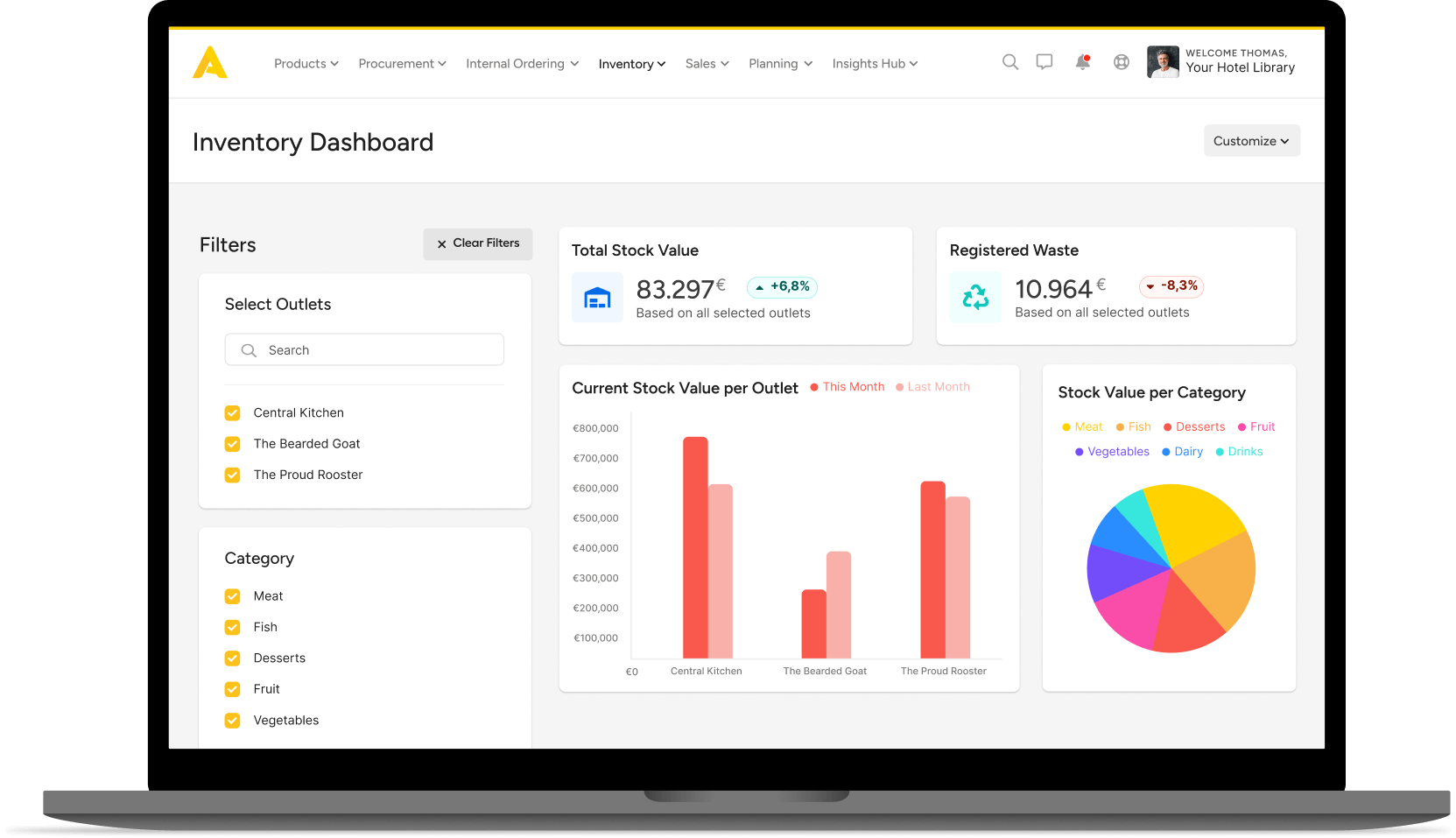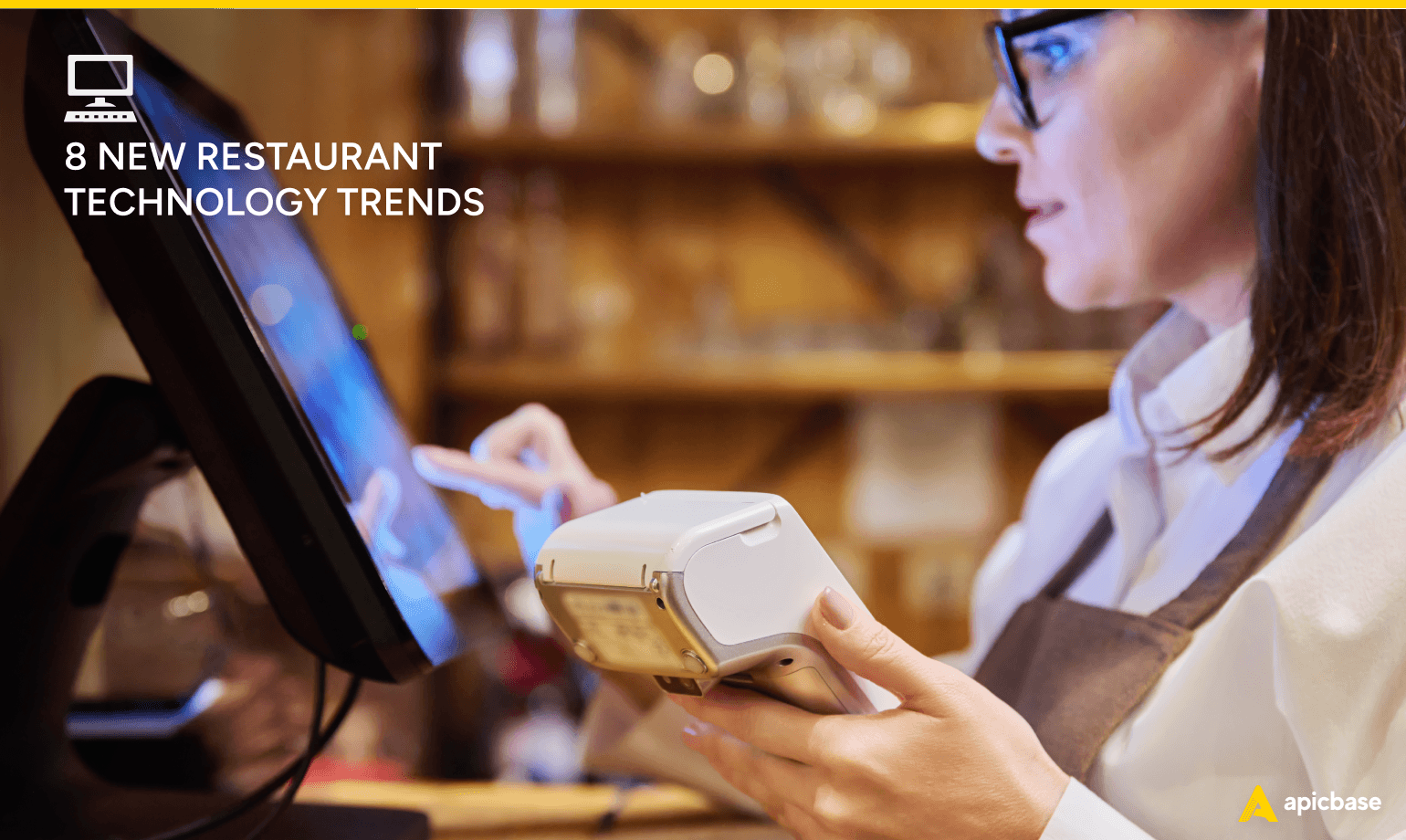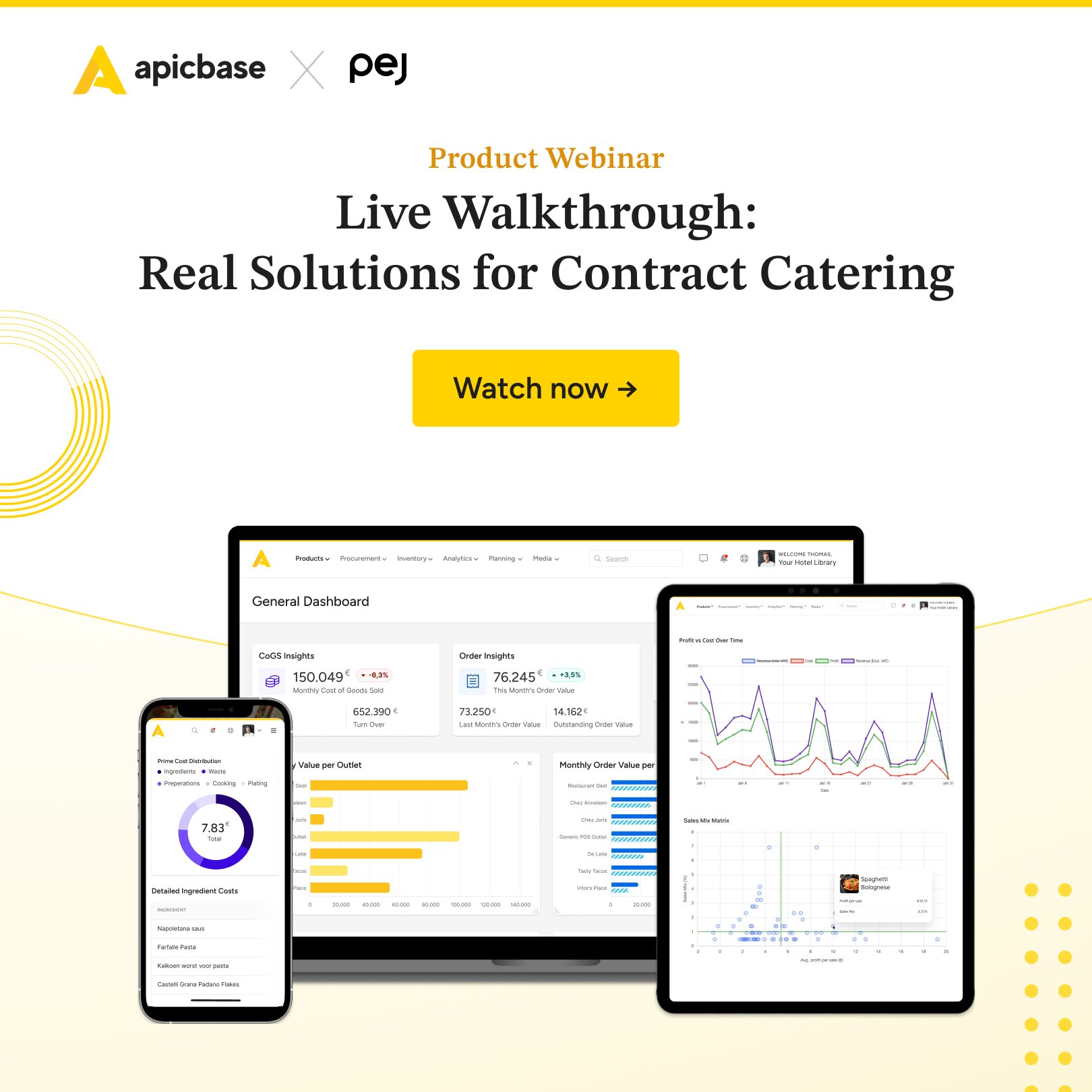The industry is undergoing a major digital transformation. Evolving consumer behaviour and market dynamics drive this shift, which is speeding up technology adoption. In this article, we explore the most impactful restaurant technology trends of 2024.
The National Restaurant Association’s Restaurant Technology Landscape Report 2024 finds that 76% of operators say using technology gives them a competitive edge.
Tech helps operators to remain competitive. The tools help them improve daily operations, customer satisfaction, and profitability. “But many believe their restaurants could do more to keep up with technology.” Keeping up with new developments is crucial.
Some good examples are Customer Relationship Management (CRM) systems. They help your teams better understand and engage with customers. A modern point of Sale (POS) system simplifies transactions and tracks sales data. Advanced inventory management systems, such as Apicbase, ensure your restaurants stay stocked, and food costs are under control.
The Best Restaurant Technology Trends
New technology is always popping up, and staying ahead of the curve can be a little overwhelming. The last thing you want is to fall behind your competitors. With restaurant technology trends constantly evolving, restaurant operators need to keep up.
Consider the following smart restaurant tech options to ensure that you’re doing everything you can to boost the success of your restaurants.
Inventory Management Systems
Restaurant inventory management software is a powerful tool for efficiently tracking and managing your restaurant’s F&B and supplies. These systems are critical in guaranteeing that your kitchens run smoothly and cost-effectively.
An inventory management system tracks your stock levels, alerts you when supplies are low, and predicts future needs based on past use.
The increased focus on efficiency and operational excellence drives many of today’s emerging restaurant technology trends. Advanced inventory management technology is a significant part of this shift. A few years ago, foodservice operations prioritised new technology primarily to increase revenue. However, cost management has now become a central concern.
Effective cost control is closely linked to inventory control, as food costs can consume 20-35% of revenue. Reducing these costs by even a few percentage points significantly boosts profits.
POS systems have offered basic inventory tools for years, but the trend now shows that restaurant and catering operations require advanced technology to monitor stock depletion in greater detail. This technology helps track both theoretical and actual food costs, a crucial concern for operators and executives.
Closing the gap between theoretical and actual costs is particularly important for complex operations, such as those with multiple outlets ordering semi-finished products from a central production kitchen.
Inventory management software helps reduce waste, avoid over-ordering, and ensures you have the necessary ingredients to meet customer demand. This not only saves money but also helps maintain consistency in your menu offerings.
An efficient inventory system can integrate with your POS system, providing real-time data on sales and restocking needs. This connectivity allows you to make informed purchasing and inventory decisions, ensuring you address issues promptly.
In an industry known for its thin margins, precise control over stock movements can significantly improve your bottom line and provide a competitive edge. By minimising waste and optimising stock levels, you can offer consistent quality and better pricing, which can set you apart from competitors.

POS Systems (Point of Sale)
A Point of Sale (POS) system is an integrated restaurant IT solution that combines hardware and software to manage sales transactions and business operations. For your restaurants, POS systems are vital—they’re designed to streamline your day-to-day operations and help you boost your profits.
POS systems often include features for payment processing, sales tracking, table management, customer satisfaction, and more. They even include CRM features to improve the customer experience.
A good POS system empowers restaurant owners to improve productivity and efficiency without sacrificing quality or employee satisfaction. POS systems can also help reduce labour costs in the long term. Additionally, POS systems offer detailed sales tracking, giving your restaurant the tools to monitor what sells well and what doesn’t.
A POS system is one of the most important restaurant technologies. Whether you’re running a fast food chain or a high-end dining experience, POS systems are the perfect way to streamline sales.
CRM Systems (Customer Relationship Management)
Customer Relationship Management (CRM) systems are powerful tools designed to help you understand, manage, and enhance your interactions with your customers.
A CRM system is invaluable for restaurant managers. It goes beyond keeping a record of your customers. It collects and analyses customer preferences, behaviours, and feedback. This data lets you create personalised experiences that build loyalty and encourage repeat business.
Imagine being able to remember a regular customer’s favourite dish or knowing exactly when to send a special promotion to a guest who last visited a while ago. With a CRM system, you can track these details effortlessly, tailoring your marketing efforts to individual preferences and enhancing customer satisfaction.
CRM systems can connect with your POS system, giving you insights into spending patterns and dining habits. This holistic view helps you make data-driven decisions, from menu changes to targeted marketing campaigns, driving growth and profit for your restaurant.
Self-Serve Kiosks
Self-service kiosks are touch-screen terminals that let customers place their orders directly. They streamline the ordering process and enhance the dining experience. Integrating self-service kiosks into your restaurant offers several benefits.
First, these kiosks can significantly reduce wait times, especially during peak hours, by allowing customers to place their orders independently, freeing up your staff to focus on food preparation and customer service.
These self-order kiosks also improve order accuracy, as customers input their preferences directly, minimising the risk of miscommunication and errors that can occur with traditional verbal orders.
Furthermore, self-service kiosks can be integrated with your CRM and POS systems, providing valuable data on customer preferences and ordering patterns.
Self-service kiosks appeal to tech-savvy customers who appreciate the convenience and speed of digital interactions. By adopting this technology, you can modernise your restaurant, meet evolving customer expectations, and stay competitive in the ever-changing hospitality landscape.
Kitchen Display Systems
Kitchen Display Systems (KDS) are digital screens used in the kitchen to streamline and organise the preparation and cooking process. Implementing a KDS can bring numerous advantages for restaurant owners, significantly enhancing kitchen operations and overall service quality.
A KDS replaces traditional paper tickets with a digital interface, allowing orders to be displayed in real-time. This reduces the risk of lost or unreadable tickets and ensures that your kitchen staff can immediately see and prioritise orders.
With a KDS, orders are clearly displayed, and any modifications or special requests are prominently highlighted, reducing errors and improving order accuracy.
Like with most new restaurant tech, a KDS can integrate with your POS system, providing seamless communication between the front of the house and the kitchen. With this, when an order is placed at the POS, it instantly appears on the KDS, speeding up the order fulfilment process and reducing wait times for your customers.
Additionally, a KDS can help manage kitchen workflow by prioritising orders and tracking preparation times, which helps your staff work more efficiently and consistently.
No restaurant technology set is complete without a Kitchen Display System – you enhance the efficiency, accuracy, and communication within your kitchen, which translates to a smoother operation and a better dining experience for your guests.
Table Management Systems
Table management systems are tools designed to optimise reservations, seating, and table turnover in your restaurant. Implementing a table management system helps your managers improve operational efficiency and customer satisfaction.
An online table reservation system allows staff to view and manage reservations in real time, giving them a clear overview of your seating capacity and current table status. This reduces wait times and maximises the use of available tables, ensuring that you can accommodate more guests during busy periods.
The system can also help you strategically allocate tables based on party size and reservation times, balancing the flow of customers to avoid overwhelming the kitchen and waitstaff.
A table management system can integrate with your POS and CRM systems to offer insights into customer preferences and dining habits, allowing you to provide personalised service and enhance the dining experience.
QR Codes
QR codes are barcodes that can be scanned with a smartphone to quickly access information or perform actions online. Using QR codes in your restaurant can improve both customer experience and efficiency.
One main use of QR codes in restaurants is for digital menus. By placing QR codes on tables, customers can scan them to view your menu on their phones. This reduces the need for physical menus and helps maintain hygiene standards.
QR codes can also streamline ordering and payment. Customers can use QR codes to place orders directly from their phones, sending their choices straight to your kitchen. This reduces wait times and order errors, allowing your staff to focus on providing excellent service.
For payments, QR codes let customers pay their bills quickly and securely via their phones, making their dining experience more convenient. QR codes can also encourage user-generated content and boost customer loyalty through rewards and discounts.
By using QR codes, you can modernise your restaurant with online ordering, improve customer satisfaction, and increase efficiency. This helps you keep up with current technology trends and customer expectations.
Event Ticketing Systems
Event ticketing systems are digital platforms that help you manage and sell tickets for events at your restaurant. For restaurant owners, using an event ticketing system can improve operational efficiency and customer engagement.
Hosting events like wine tastings, live music, cooking classes, or themed dinners can attract new customers and offer a unique dining experience.
An event ticketing system makes organising these events easier. Customers can buy tickets online, providing convenience and reducing the administrative burden on your staff, who no longer have to manage reservations and payments manually.
One key advantage is the ability to monitor ticket sales in real-time. This gives you insights into the popularity of your events and helps you make data-driven decisions about future offerings.
These systems also come with features like automated reminders and digital ticketing, enhancing the customer experience by providing easy communication and access to event details.
By using an event ticketing system, you can efficiently manage event logistics, increase attendance, and create memorable experiences that set your restaurant apart. This boosts your revenue and strengthens your brand, fostering a loyal customer base that looks forward to your next event.
The Benefits of Technology for Restaurant Owners
In today’s competitive market, embracing technological advancements is crucial for restaurant owners seeking success. Leveraging modern tools and foodservice tech innovations streamlines operations and enhances the customer experience, driving profitability and growth.
Operational Efficiency
Advanced POS systems streamline order-taking processes, reducing errors and saving time. Integrated inventory management systems optimise stock levels, preventing shortages and minimising waste. Additionally, CRM systems enhance customer satisfaction and loyalty.
Restaurant technology trends indicate a strong demand for tools that enhance operational efficiency, boost sales, and increase profits. This reflects the industry’s current state and the direction in which executives are steering it: towards increased automation, data-driven decision-making, and improved customer experiences. Executives are integrating advanced technologies to streamline operations, personalise services, and optimise profitability.
Data-Driven Decision Making
By deeply analysing sales trends and customer preferences, you can make informed decisions on menu optimisation and adjust your pricing strategies using real-time data. Access to key metrics through restaurant analytics software enables targeted marketing campaigns, fostering business growth and enhancing overall efficiency through data-driven decision-making.
Improved Customer Loyalty & Satisfaction
Restaurant technology, such as QR codes and CRM systems, significantly enhances the customer experience and boosts retention through loyalty programs. These tools reduce wait times, collect valuable data on customer preferences, and support robust table management.
In summary, the restaurant industry is equipped with powerful technology designed to elevate the customer experience and drive sustained success.
Improved Communication & Collaboration
With internal messaging platforms and a centralised dashboard, you can facilitate seamless communication between front-of-house and kitchen teams. Back-of-house automation facilitates collaboration and creates a single source of truth all staff can rely on.
You can also use employee scheduling software to simplify the scheduling processes, considering staff availability and labour costs.
Adaptability to Restaurant Industry Tech Trends
As tech constantly evolves, keeping up is key. When you have a clear picture of the different restaurant technology trends, you can make informed decisions about what makes the most sense for your restaurant based on its current capacity and your existing budget.
Control Over Online Food Ordering
You can integrate your own food delivery tech or add yourself to food delivery apps for trusted and reliable online ordering.
You can track drivers, communicate with customers, and resolve issues with integrated food delivery tech.
Final Thoughts on the Restaurant Technology Trends of 2024
Restaurants must embrace technology to thrive in today’s brutally competitive food service industry. With rapidly changing consumer behaviour and erratic food costs, closely monitoring sales trends, inventory patterns, and food cost evolutions is crucial.
Staying updated on restaurant technology trends gives your restaurants an edge. Leading foodservice operations use robust POS systems, CRM systems, inventory management systems, and self-serve kiosks to enhance operations. This boosts efficiency, improves customer experience, and enables data-driven decisions.
While survival is possible without these tools, adopting them significantly increases your chances of success and keeps you competitive. Stay ahead in the evolving restaurant market by utilising the best technology to maintain and elevate your restaurant’s reputation.


